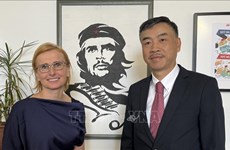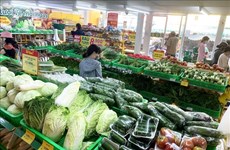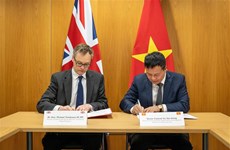Vietnam celebrates its successful ASEAN year
Vietnam has successfully concluded its
presidential term of ASEAN and left strong impressions on friends.
Vietnam has successfully concluded its
presidential term of the Association of Southeast Asian Nations (ASEAN)
2010 and has left strong impressions on ASEAN friends.
Deputy Prime Minister cum Foreign Minister Pham Gia Khiem, who is also Politburo member of the Communist Party of Vietnam Central Committee, has written articles on Vietnam’s contributions to promoting regional connectivity and the strong development of ASEAN.
The Vietnam News Agency would like to present a number of excerpts:
Entering the last month of 2010, it can be affirmed that Vietnam’s presidential term of ASEAN has successfully concluded, achieved its set targets and contributed to enhancing solidarity and promoting the construction of the ASEAN Community, as well as efficiently assisted the Vietnamese Party and State’s diplomatic requirements and enhanced Vietnam’s role and international position.
The success of the presidential term was reflected in important practical results, and the long lasting impact of Vietnam’s imprint.
Looking back to the last stage, filled with busy events and considerable difficulties and challenges, we are happy and proud to attain these results in terms of ASEAN’s common interest and Vietnam’s direct interest.
Firstly, Vietnam has competently implemented its task as Chair of ASEAN with the “Proactive, positive and responsible” motto through which Vietnam’s role and international position have been raised.
Since the beginning of 2009, Vietnam has prepared in all fields to assume this great responsibility. The theme, “Toward the ASEAN Community: from Vision to Action,” proposed by Vietnam has received warm welcome from other ASEAN member countries and has virtually become the orientation for the association’s activities with priority focuses on speeding up the construction of the ASEAN Community, enhancing ASEAN external relations, ensuring the central role of the association in the region and accelerating broad cooperation to maintain regional peace, security and sustainable development, as well as cope with global challenges.
During the year, Vietnam has organised and operated smoothly many important and repeated ASEAN events including two summits: the 16th ASEAN Summit (ASEAN–16) and the 17th ASEAN Summit (ASEAN-17), National Assembly’s activities (the General Assembly of the ASEAN Inter-Parliamentary Assembly), more than 10 ministerial meetings, more than 20 senior officials meetings on politics and security, economics, and socio-culture and activities of mass organisations (the ASEAN People Forum) and businesses (the ASEAN Business and Investment Summit).
Vietnam has run conferences with real discussions in a constructive atmosphere with high consensus on a number of important issues. In particular, Vietnam has worked on the basis of close consultation with concerned countries and created a broad common view on many complicated issues directly related to ASEAN such as the East Sea situation, Myanmar, Thailand and the Korea peninsula. In addition, Vietnam has successfully lobbied to represent ASEAN at the Group of 20 (G20) conferences in Canada and the Republic of Korea (RoK), as well as made important and practical contributions to the results of these conferences on the basis of close consultation with other ASEAN nations.
ASEAN connectivity and unity have seen new developments in quality and in the depth and closer direction. The outstanding feature of the year is an important change in ASEAN cooperation in improved activities and enforcement.
On politics and security, the implementation of a master plan on building the ASEAN Politics-Security Community (ASPC), especially the acceleration of 14 priority fields, has enhanced dialogue and cooperation on political and security issues and the understanding and trust among nations for the common benefit of regional peace, security, cooperation and development.
Dialogue mechanisms and regional political and security cooperation, particularly the ASEAN Regional Forum (ARF), have continued strong operation with the establishment of a number of new mechanisms, including the ASEAN Defence Ministers’ Meeting Plus (ADMM+), the meeting of ASEAN Chiefs of Security Agencies (MACOSA) and the ASEAN Maritime Forum (AMF).
Tools to ensure regional peace and security have continued to be consolidated and brought into play, particularly the Treaty of Amity and Cooperation (TAC), the Southeast Asia Nuclear Weapons Free Zone (SEANWFZ) and the Declaration on the Conduct of Parties in the South China Sea (East Sea) (DOC).
A master plan on building the ASEAN Economic Community (AEC) has been strictly implemented according to set targets and itinerary and has recorded satisfactory progress. With great national and regional efforts, ASEAN has been effectively implementing the itineraries of liberalisation and facilitation of trade, service, investment through important agreements such as the ASEAN Trade in Goods Agreement (ATIGA), the ASEAN Comprehensive Investment Agreement (ACIA) and the eighth package of commitments under the ASEAN Framework Agreement on Services.
In terms of culture and society, the implementation of a master plan on setting up an ASEAN Social-Cultural Council (ASCC) has made positive progresses.
Most remarkably, the creation and approval of a master plan on ASEAN Connectivity, an important document that supplements the ASEAN Community roadmap, will contribute to boosting ASEAN connection and create a foundation for the expansion of connectivity throughout East Asia.
The plan proposes targets and measures to increase ASEAN connectivity in three priorities – infrastructure, institution and people – especially in the Mekong sub-region.
At the same time, the ASEAN Charter has been translated into reality, laying a legal foundation and regulation framework for the increase of ASEAN connectivity, with the short-term objective being support for the establishment of an ASEAN community.
Additionally, ASEAN external relations have been strengthened, strongly assisting the bloc’s targets of peace, security and development.
During the year, the relations between ASEAN and its major partners within the framework of ASEAN+1 have been intensified and heightened. The organisation of the ASEAN+1 summits with Russia, Australia, New Zealand, the US and the UN, apart from the annual separate summits with China, Japan, the Republic of Korea (RoK) and India has created further development drive in the relations between ASEAN and these partners.
Specifically, ASEAN and RoK have lifted their relations to strategic partnership, while the strategic partnerships between ASEAN and China and Japan have been deepened, ties with the US have been upgraded to strategic and with India, Australia, New Zealand, Russia, the EU, Canada and the UN have been turned into comprehensive partnerships.
Regional forums where ASEAN plays a key role, especially the ASEAN+3 and East Asia Summit (EAS), continued to develop dynamically, contributing to strengthening dialogue and wide cooperation in East Asia.
Furthermore, ASEAN’s regional role and its international position have been improved.
ASEAN has reached high consensus on an issue that while giving priority to setting up an ASEAN community, the association would continue to boost external relations and play a central role in a regional structure in the making, creating conditions for important partners to take part and make contributions to dealing with matters related to peace, security and development in the region, as well as assisting the formation of the ASEAN Community.
ASEAN decided to welcome Russia and the US to East Asia Summit (EAS) on the basis of supporting ASEAN’s central role and respecting EAS objectives, principles, regulations and priorities.
ASEAN also determined to implement measures to increase the effectiveness of current forums in which ASEAN plays a decisive role, including ASEAN+1, ASEAN+3, EAS and ARF, and set up ADMM+ framework.
The bloc also upholds its important role thanks to positive contributions at other forums, such as APEC, ASEM, the Forum for East Asia-Latin America Cooperation (FEALAC), G20 and UN.
Regional dialogue and cooperation to maintain peace and security as well as sustainable development and coping with climate change and global challenges have been strongly and widely strengthened through different frameworks and levels.
Despite complex changes, regional peaceful environment and security have basically been consolidated and promoted, mainly thanks to increasing dialogue and the building of mutual trust and cooperation on political matters in the region.
Tools ensuring regional security continue to uphold the formation and sharing of standards of behaviour between countries.
The accession of Canada and Turkey to the Treaty of Amity and Cooperation (TAC) as well as the EU's upcoming participation will raise the number of ASEAN outsiders in TAC to 19, helping make the treaty become a code of conduct guiding relations between countries when joining regional activities.
The implementation of the Declaration on the Conduct of Parties in the East Sea (DOC) has gained encouraging developments with the ASEAN-China joint working group resuming talks. Added to this, a Senior Officials Meeting on DOC is expected to convene soon.
Many countries within and outside the region show their concern and share a common view on the necessity of maintaining peace and security in the East Sea, dealing with disputes in a peaceful manner according to international law, especially the UN Convention on the Law on Sea 1982, and implementing DOC effectively, with a view looking towards the approval of a Code of Conduct (COC) on the East Sea.
Frequent dialogue at all levels on other regional and international matters, including Myanmar and the Korean peninsula, have helped increase mutual understanding and trust between related countries, creating favourable conditions for seeking proper solutions by peaceful measures.
Vietnam’s relations with other ASEAN members and outsiders have developed strongly in a practical way.
Vietnam has managed to promote the land, people, history, cultures and potential of the country while hosting ASEAN events.
In short, Vietnam has fulfilled its ASEAN president term in 2010, leaving behind a deep impression of the national identity. Achievements recorded in 2010 have strengthened the ASEAN alliance, while relations between the grouping and its partners have ushered in an era of action and have been brought to a new height and geared to a more comprehensive and substantial dimension. The achievements have also determined ASEAN’s central role in a regional structure in the making, generating a momentum for ASEAN to advance towards an ASEAN community by 2015.
On the other hand, Vietnam will further scrutinise outstanding issues to work out suitable policies in cooperation with ASEAN in the years to come, to create a region of peace, security, cooperation and development in the interests of both ASEAN and Vietnam.
Foreign leaders and delegates as well as world public and mass media have all lauded the role played by Vietnam during its ASEAN presidency.
Vietnam’s successful ASEAN president term has marked a significant step forward in its road towards regional and international integration. Active efforts and contributions made by Vietnam to ASEAN growth have once more proven the nation’s unswerving policy to treasure ASEAN in both multilateral and bilateral relations and to do its best for a stronger and more united ASEAN with closer connectivity. These efforts are part of Vietnam’s long-term strategy and are an integral part of the nation’s external policy of independence, self-alliance, diversification of relations and taking initiative in regional and international integration.
As an eventful and busy year closes with major ASEAN achievements, Vietnam has ample grounds to believe in a bright future for an ASEAN community to emerge as strong, united and prosperous by 2015./.













